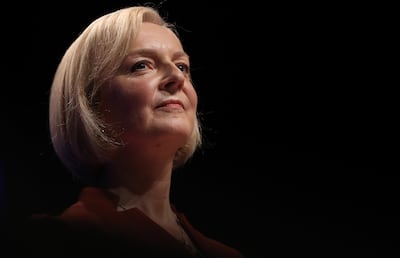Two environmental protesters were the unlikely rescuers of Liz Truss’s premiership-defining speech at the Conservative party conference on Wednesday.
Minutes into her pitch to win over her fractured party, two Greenpeace campaigners brandished a banner critical of the government’s reversal on fracking for oil.
“Let’s get them removed,” Ms Truss said, as security guards hauled the women out of the Birmingham conference hall.
The prime minister stood at the lectern as the boos followed by “out, out, out” faded.
“Come on Liz!” someone shouted from the auditorium.
Clapping became raucous applause then a standing ovation. There was a marked shift in mood in the prime minister's favour, and perhaps even a hint of endearment towards a leader one troubled month into her job.
Ms Truss turned from her autocue speech to say the campaigners were part of the “anti-growth coalition” that was holding Britain back.
Growth was the thrust of her conference speech and her attempt to restore her authority damaged by a bungled tax-cutting mini-budget this week.
The rebellion among her MPs, including some Cabinet ministers, appeared to have been quelled as Ms Truss grew in confidence.

She did not repeat Margaret Thatcher’s “the lady’s not for turning” but Ms Truss is steadfastly refusing to reverse course.
No matter the consequences, in particular high interest rates that will hit homeowners hard, the prime minister will pursue her plan of a low-tax economy to generate “growth, growth, growth,” she said.
“I will not allow the anti-growth coalition to hold us back,” she said, rounding on growing opposition in Parliament and on the streets.
“Labour, the Lib Dems, the SNP, the militant unions, the vested interests dressed up as think tanks, the talking heads, the Brexit deniers, Extinction Rebellion and some of the people we had in the hall earlier.”
These were the types who favoured “protesting to doing” or “talking on Twitter to taking tough decisions”.
“It’s always more taxes, more regulation and more meddling,” Ms Truss said to more applause. “Wrong, wrong, wrong!”
This reception seemed more genuine than the lukewarm response to an opening video clip that highlighted her transient upbringing in Scotland and Yorkshire.
Her nerves were evident as she lifted a glass of water with both hands, before recalling a moment of sexism in her childhood following a flight when she was awarded a junior air hostess badge while her two brothers received pilot badges.

A brief reference was made to “raising two wonderful daughters” but not one to her husband, Hugh, or to her predecessor Boris Johnson.
She proclaimed herself as the first prime minister to come from a state comprehensive school and said she had experienced the same shock as every other worker “at how much the taxman took out of my first payslip”.
There were a few slips. She went straight through praising “our dynamic new chancellor”, Kwasi Kwarteng into her next sentence and forgot to wait for the choreographed applause.
She backtracked, allowed the clapping, then, in a moment of contrition over the debacle of the tax cut to high earners she reversed on Monday, said: “I get it and I have listened.”
In London, the FTSE-100 index of blue chip shares ticked steadily upwards from a low before the 11am speech.
Perhaps it was spurred on by her “I love business” line, which was in contrast to Mr Johnson’s expletives against business.
There were a few policy lines. Britain would continue its fight to remove the European Court of Human Rights it helped to found from domestic legislation.
The programme to deport illegal immigrants to Rwanda would continue unhindered, and all EU laws on business administration would be scrapped.
To louder applause Ms Truss pledged Britain’s support for Ukraine in its fight against Russian occupation.
“No matter how long it takes,” she said. “Ukraine can win, will win, Ukraine must win.”
The “anti-growth coalition” came in for fire as the prime minister voiced her determination to turn Britain into on a low-tax, low-regulation economy — no matter the consequences.
“I will take the hard choices,” she said, before striding offstage. “It’s a new Britain for a new era.”





























